Getting started in Tamale
Before I get started, I just want to send a huge THANK YOU to all of you who have helped to make my placement here in
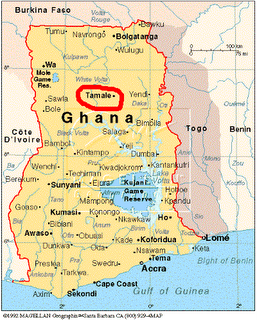 Want to hear more about
Want to hear more about
There are MANY things that this crotchety old westerner found difficult to get used to in my first weeks. 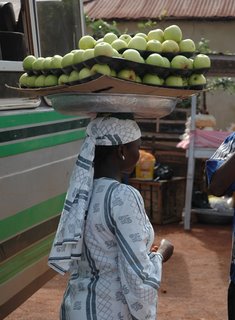 First, privacy is hard to come by! When you make a new friend, the first thing they will ask is ‘where do you live?’ You will likely receive a visit when you wake in the morning and when you return from work at night! Second, the food is incredibly good, but hard for your digestive system to get accustomed to at first!! A few ‘unpleasant’ side-effects from the Banku, TZ, Kinkei, and fou-fou have taught me to pace myself and to acclimatize before digging into a full Ghanaian diet. Third, 6am is sleeping in!!! This is perhaps the toughest one for this seasoned student! Busses often leave at 5am to the villages, and so I have been witness to many busy pre-dawn streets lined with women fetching water, women preparing the day’s food for sale, and
First, privacy is hard to come by! When you make a new friend, the first thing they will ask is ‘where do you live?’ You will likely receive a visit when you wake in the morning and when you return from work at night! Second, the food is incredibly good, but hard for your digestive system to get accustomed to at first!! A few ‘unpleasant’ side-effects from the Banku, TZ, Kinkei, and fou-fou have taught me to pace myself and to acclimatize before digging into a full Ghanaian diet. Third, 6am is sleeping in!!! This is perhaps the toughest one for this seasoned student! Busses often leave at 5am to the villages, and so I have been witness to many busy pre-dawn streets lined with women fetching water, women preparing the day’s food for sale, and  women sweeping garbage and dirt from the roadways. Hmmmm… is it just me, or do the women here seem to do all of the work?! Fourth, the chaos!!!! You can’t catch a tro-tro ride without some kind of mad pushing and shoving to get into or out of your seat. Add that to filling the tro-tro with at least twice the recommended capacity of people, and you start to feel a little uneasy. Despite all of the necessary adjustments, all of these things have made my first weeks an exciting time.
women sweeping garbage and dirt from the roadways. Hmmmm… is it just me, or do the women here seem to do all of the work?! Fourth, the chaos!!!! You can’t catch a tro-tro ride without some kind of mad pushing and shoving to get into or out of your seat. Add that to filling the tro-tro with at least twice the recommended capacity of people, and you start to feel a little uneasy. Despite all of the necessary adjustments, all of these things have made my first weeks an exciting time.
So I am trying to learn Dagbani, the language of the Dagomba people in the central part of the Northern Region. 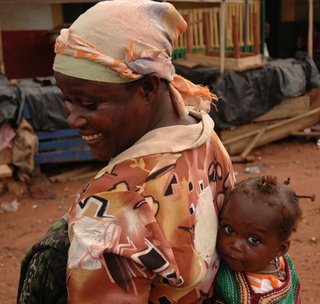 Many greetings are easy to remember – ‘good morning’ is (in phonetics) ‘da-si-ba’. The response is ‘Naaaaaaaa!’ (meaning good or fine). ‘How is the coolness (of the morning)’ is ‘too-ma-soom’. The response to this is ‘Naaaaaaa!’. Good afternoon is ‘An-tir-eh’. The response is……. ‘Naaaaaaa!’. And so on. There are some greetings that deviate from this pattern, but I haven’t got those down yet, and I’ll leave them out for now. People at work will try to trip me up by throwing in a ‘how is your husband?’ or something. So when I reply Naaaaaa, they’re rolling with laughter! I also have finally received my first Ghanaian name, courtesy of a friendly family in Karaga. It is ‘Wuni Zoya’, meaning ‘God is Great!’. Not bad.
Many greetings are easy to remember – ‘good morning’ is (in phonetics) ‘da-si-ba’. The response is ‘Naaaaaaaa!’ (meaning good or fine). ‘How is the coolness (of the morning)’ is ‘too-ma-soom’. The response to this is ‘Naaaaaaa!’. Good afternoon is ‘An-tir-eh’. The response is……. ‘Naaaaaaa!’. And so on. There are some greetings that deviate from this pattern, but I haven’t got those down yet, and I’ll leave them out for now. People at work will try to trip me up by throwing in a ‘how is your husband?’ or something. So when I reply Naaaaaa, they’re rolling with laughter! I also have finally received my first Ghanaian name, courtesy of a friendly family in Karaga. It is ‘Wuni Zoya’, meaning ‘God is Great!’. Not bad.
Thanks to the spirited head-butting of an Italian player in the world cup recently, and because apparently bald white men are hard to tell apart, I constantly hear people yelling to me from a distance ‘Zidane!, Zidane!’. I reply with a head butt motion, which is received with roaring laughter every time! I greeted some guys in the market who were calling me Zidane, and they honestly thought I was the real thing. They asked, ‘what are you doing here Zidane!?, why are you in
In my first weeks here I have visited many district capitals to see what the EWB Junior Fellows (JFs) have been up to, 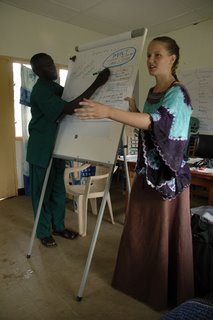 and to meet with members of MoFA as well as farmers and their families. I have visited Yendi, Damongo, Salaga, and Karaga so far, each with a multi hour tro-tro ride over insanely bumpy roads. Most of my time has been spent with the JFs and MoFA personnel, however I managed a little excursion to a farming village called Zakoli, where I got a small taste of rural life (see below). The JFs have been busy carrying out Adult Education (AE) workshops with Agric Extension Agents (AEAs) and other members of MoFA in their district, so I was able to see how things were working. The AEAs are a primary focus for training since their job is to work directly with farmers to communicate ‘best practices’ for farming that hopefully will lead to better food security. The AE workshops have primarily been focused on promoting a shift towards valuing results in MoFA’s work rather than counting ‘activities’ as accomplishments. In one example, MoFA has traditionally counted success as the number of farmer’s workshops or demonstrations an AEA will carry out in a season, without any measure of what farmers have taken away from these activities. A shift in focus on the actual ‘outcomes’ of these
and to meet with members of MoFA as well as farmers and their families. I have visited Yendi, Damongo, Salaga, and Karaga so far, each with a multi hour tro-tro ride over insanely bumpy roads. Most of my time has been spent with the JFs and MoFA personnel, however I managed a little excursion to a farming village called Zakoli, where I got a small taste of rural life (see below). The JFs have been busy carrying out Adult Education (AE) workshops with Agric Extension Agents (AEAs) and other members of MoFA in their district, so I was able to see how things were working. The AEAs are a primary focus for training since their job is to work directly with farmers to communicate ‘best practices’ for farming that hopefully will lead to better food security. The AE workshops have primarily been focused on promoting a shift towards valuing results in MoFA’s work rather than counting ‘activities’ as accomplishments. In one example, MoFA has traditionally counted success as the number of farmer’s workshops or demonstrations an AEA will carry out in a season, without any measure of what farmers have taken away from these activities. A shift in focus on the actual ‘outcomes’ of these 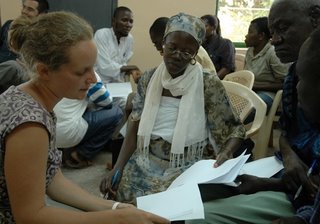 activities will hopefully lead to an appreciation of farmers needs and more effective teaching or guidance. Through activities such as dramas, group brainstorming and discussion, and creating workplans, the participants of the AE workshops are encouraged to explore the connections between their work and the impact it can have on helping farmers escape poverty. From what I have seen, the response has been very promising. I have witnessed many AEAs in intense discussion over how to better serve the farmers by changing their outreach approach. Pretty cool stuff.
activities will hopefully lead to an appreciation of farmers needs and more effective teaching or guidance. Through activities such as dramas, group brainstorming and discussion, and creating workplans, the participants of the AE workshops are encouraged to explore the connections between their work and the impact it can have on helping farmers escape poverty. From what I have seen, the response has been very promising. I have witnessed many AEAs in intense discussion over how to better serve the farmers by changing their outreach approach. Pretty cool stuff.
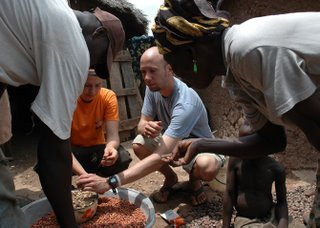 So finally, here are a few pictures of myself in the
So finally, here are a few pictures of myself in the 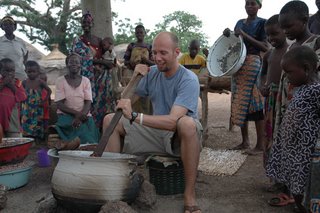 went into preparing the nuts once they were harvested! It seems that the men work in the fields, usually with the equipment such as a tractor (if available), and the women basically do everything else! Anyhow, we helped to break open the groundnuts and also to stir the roasting Shea nuts, which will be made into Shea butter. More on that later. Enjoy the pictures!
went into preparing the nuts once they were harvested! It seems that the men work in the fields, usually with the equipment such as a tractor (if available), and the women basically do everything else! Anyhow, we helped to break open the groundnuts and also to stir the roasting Shea nuts, which will be made into Shea butter. More on that later. Enjoy the pictures!



0 Comments:
Post a Comment
<< Home